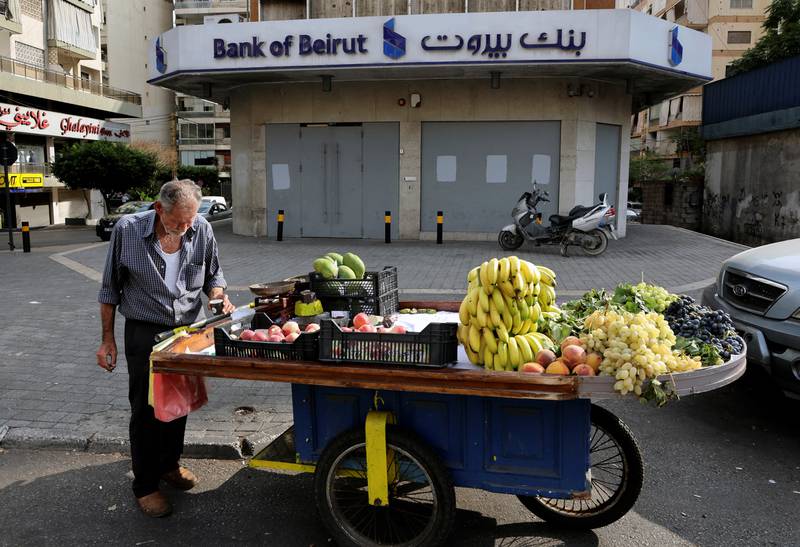Lebanon inflation rate increases 189% in first 11 months

Collected Image
Inflation in Lebanon increased an average 189.4 per cent in the first 11 months of 2022, from the same period a year earlier, according to data from the Central Administration of Statistics.
Hyperinflation continued for the 29th consecutive month, rising annually to about 142.4 percent in November from the same month a year earlier, the administration's Consumer Price Index showed. The CPI increased about 3.74 percent from October 2022. Lebanon is expected to post the second-highest inflation rate in the world this year, behind Sudan, according to Fitch Solutions.
The country is in the grip of an economic crisis described by the World Bank as one of the worst in modern history and has yet to enforce critical structural and financial reforms required to unlock $3 billion of assistance from the International Monetary Fund.
Reforms hinge on the formation of a new government, the election of a president and consensus among the country's political elite.
Politicians are deadlocked over the formation of a new cabinet seven months after parliamentary elections were held and after the six-year term of former president Michel Aoun expired at the end of October.
Political impasses have led to political vacuums in the country in the past and stalled its economic progress.
Lebanon was without a president for two and a half years until Mr Aoun's election by the 128-seat parliament in 2016. His predecessor, Michel Sleiman, was elected in 2008 after the position had been vacant for 18 months.
Securing IMF backing will help to unlock a further $11 billion of assistance that was pledged at a Paris donor conference in 2018, which is also tied to a string of reforms.
Lebanon's economy collapsed after it defaulted on about $31 billion of eurobonds in March 2020, with its currency losing more than 90 per cent against the dollar on the black market.
According to the latest CPI reading, the price of miscellaneous goods and services in November increased fivefold while the cost of water, electricity, gas and other fuels rose more than four times.
Communication costs increased more than fourfold while education and transport prices soared more than three times each.
Rates at restaurants and hotels and the prices of food and non-alcoholic beverages more than tripled.
The World Bank projects that Lebanon's real gross domestic product will contract 5.4 percent in 2022, assuming the “political paralysis” continues and there is no action to put in place an economic recovery strategy.
This year's contraction comes after the economy shrank by about 58 percent between 2019 and 2021 — the largest contraction among 193 countries, the Washington-based lender said in a report in January 2022.
Hyperinflation continued for the 29th consecutive month, rising annually to about 142.4 percent in November from the same month a year earlier, the administration's Consumer Price Index showed. The CPI increased about 3.74 percent from October 2022. Lebanon is expected to post the second-highest inflation rate in the world this year, behind Sudan, according to Fitch Solutions.
The country is in the grip of an economic crisis described by the World Bank as one of the worst in modern history and has yet to enforce critical structural and financial reforms required to unlock $3 billion of assistance from the International Monetary Fund.
Reforms hinge on the formation of a new government, the election of a president and consensus among the country's political elite.
Politicians are deadlocked over the formation of a new cabinet seven months after parliamentary elections were held and after the six-year term of former president Michel Aoun expired at the end of October.
Political impasses have led to political vacuums in the country in the past and stalled its economic progress.
Lebanon was without a president for two and a half years until Mr Aoun's election by the 128-seat parliament in 2016. His predecessor, Michel Sleiman, was elected in 2008 after the position had been vacant for 18 months.
Securing IMF backing will help to unlock a further $11 billion of assistance that was pledged at a Paris donor conference in 2018, which is also tied to a string of reforms.
Lebanon's economy collapsed after it defaulted on about $31 billion of eurobonds in March 2020, with its currency losing more than 90 per cent against the dollar on the black market.
According to the latest CPI reading, the price of miscellaneous goods and services in November increased fivefold while the cost of water, electricity, gas and other fuels rose more than four times.
Communication costs increased more than fourfold while education and transport prices soared more than three times each.
Rates at restaurants and hotels and the prices of food and non-alcoholic beverages more than tripled.
The World Bank projects that Lebanon's real gross domestic product will contract 5.4 percent in 2022, assuming the “political paralysis” continues and there is no action to put in place an economic recovery strategy.
This year's contraction comes after the economy shrank by about 58 percent between 2019 and 2021 — the largest contraction among 193 countries, the Washington-based lender said in a report in January 2022.
Source: https://www.thenationalnews.com
Previous Story
- Lebanon needs credible reforms to avoid destruction of...
- Business activity in Lebanon's private sector deteriorates in...
- Lebanon's $3bn deal with IMF expected to fuel...
- Banks in Lebanon say IMF agreement 'crucial first...
- Lebanon's central bank not bankrupt, governor says
- Lebanon and IMF begin talks on rescue package
- Lebanon’s prime minister backs central bank governor despite...
- Lebanon needs up to $15bn to boost its...